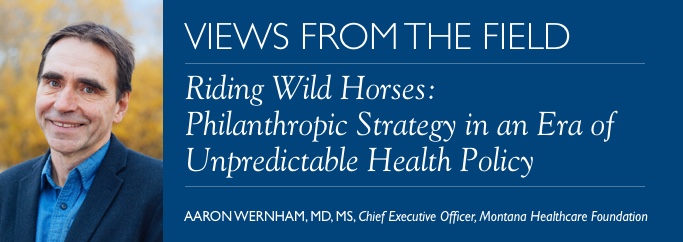
In 2015, Montana passed bipartisan legislation to expand Medicaid for low-income adults. The new coverage went into effect in January 2016. Within a year, Montana’s uninsured rate dropped from 15 to 7.4 percent and more than 30,000 thousand newly-insured people had already obtained preventive services. By the end of 2017, more than 90,000 low-income Montanans had gained coverage.
On the heels of this unparalleled opportunity for Montanans’ health, Congress began debating major changes to Medicaid in the spring of 2017, as part of an effort to repeal and replace the Affordable Care Act (ACA).
This volatility leads us to ask: what role can philanthropy play in such an unpredictable and rapidly-changing policy environment? The Montana Healthcare Foundation (MHCF) formed in 2014 and our early years of programing have corresponded with a notably chaotic time in state and federal health policy. This question has, therefore, played a significant role in the shaping of our work. With the benefit of great partnerships in Montana and nationally, what we have learned boils down to three core strategies.
Move Quickly: Produce Information at the Pace Demanded by the Policy Process
A fast-moving and unpredictable legislative process poses challenges for foundations that seek to provide relevant, timely, high-quality policy analysis. For example, the American Healthcare Act (AHCA) was introduced on March 20, 2017, and ultimately passed the House of Representatives on May 4, 2017. The Senate then took up consideration of similar legislation to repeal or revise the ACA, eventually releasing a “discussion draft” of the Better Care Reconciliation Act (BCRA) on June 23, 2017 with plans to vote as soon as possible.
Neither case left much time for in-depth analysis of how the bills might affect individual states. We felt strongly, however, that such information was indispensable for policymakers and the public.
Working with Montana Medicaid and consultants at Manatt Health we produced a report that modeled the potential effects of the AHCA on the number of Montanans insured and the financing of the state Medicaid program. The report was published on June 13, 2017, less than three months after the AHCA was introduced. Given the Senate’s intent to move quickly to a vote on its version of the legislation, we responded even more quickly to the BCRA. Along with our partners, we researched and released a report and accompanying opinion piece on June 27, 2017, only four days after the BCRA discussion draft bill was made public.
To enable us to respond quickly, we took some basic steps with our partners early-on: we mapped out the potential timeline for the Congressional process, and we cleared our schedules, set up meeting times in advance, and outlined the key analytic questions and methodologies well in advance of the bills. With this planning, strong partnerships, and clear expectations and communications among partners, it is possible to produce high-quality information at the pace demanded by a rapidly-moving policy process.
Support the Backbone: Provide Stable Funding for Organizing and Effective Health Advocacy
Montana’s Medicaid expansion came about in part through several years of dedicated work by a coalition of provider, patient, and consumer nonprofits and advocacy organizations. However, with the passage of the state’s Medicaid expansion legislation, many of these groups shifted to other priorities, and some of the national funding that had been available to support state Medicaid expansion efforts had ended.
To help ensure that Montana was well-positioned to understand and respond to health-relevant proposals from Congress, the foundation made grants to support several organizations’ general operations and broadly defined health policy work. These grants help ensure that the Montana is prepared to respond effectively to urgent, unanticipated challenges or opportunities.
Help State Systems Adapt to Change
As long as major political divisions persist over health care coverage and costs, state health systems face continued uncertainty and policy change. Therefore, a third role MHCF has played is to help the health system to adapt.
For example, Montana’s Medicaid expansion created an unprecedented opportunity to build a stronger prevention and treatment system for substance use disorders (SUDs). There was no plan in place, however, to guide decisions on what such a system should look like. Prior to the expansion, SUD services had been severely underfunded for many years through a federal block grant along with a small amount of state general fund dollars. The treatment system was correspondingly anemic: by one estimate more than 90 percent of Montanans with a SUD were not in treatment and most county health departments in Montana ranked SUDs as a leading health challenge.
To help Montana take full advantage of the Medicaid expansion to transform its SUD system, we teamed up with Montana Medicaid and our colleagues at Manatt to identify gaps in the current system and specific policy fixes. The state is now in the process of implementing many recommendations from this project. As a result, Montana is on target to more than double the number of state-approved SUD providers by the end of 2018, expand access to medication-assisted treatment for opioid use disorders, and increase investment in evidence-based prevention.
Conclusions
Strong partnerships are the common thread between each of these strategies. In our first few years of operations, MHCF has worked hard to build collaborations with providers, advocates, state and tribal health officials, and national experts. These relationships—along with the ability to flexibly deploy philanthropic capital—support a more resilient health system by enabling the state to respond quickly and flexibly to threats and opportunities as they arise.

